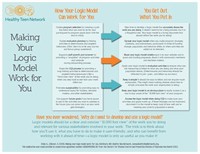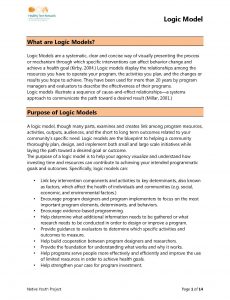Whether you are designing a new, innovative program or service from scratch or implementing an existing program or service, it’s important to use effective methods—or evidence-based approaches (or, science-based, research-based)—to ensure you reach your desired outcomes. A step-by-step systematic framework can help you no matter what stage you are in, be it design, planning, development, research, implementation, evaluation, or sustaining. For Healthy Teen Network, an important component of this step-by-step framework is also to apply a human-centered approach.
Notice: Undefined index: desc in /var/www/html/wp-content/themes/JointsWP-CSS-master/tag.php on line 36
Notice: Undefined index: asc in /var/www/html/wp-content/themes/JointsWP-CSS-master/tag.php on line 38
Sort By Date |
Sort By Title
Uncovering the Story of Community Engagement through Learning Walks
October 8, 2014
Youth Theater Group at Indigenous Peoples Task Force The Native Youth Project (NYP), funded by The Centers for Disease Control and Prevention (CDC), was implemented in seven Native American communities, namely, Choctaw Nation of Oklahoma, Indigenous Peoples Task Force, Bad River Band of Lake Superior Chippewa, The Boys and Girls Club of the Northern Cheyenne…
Read moreThe Importance of Teen Voices: “Nothing about Us without Us”

Guest Blog Post by Judith W. Herrman, PhD, RN, ANEF For some of us, remembering how teens think means only to conjure up our thoughts from a few years ago. For others, it feels like ancient history and requires some time and effort to truly represent the thoughts of a young person. But it is…
Read moreUsing a Logic Model to Support Your Programs
Have you ever wondered, “Why do I need to develop and use a logic model?” Logic models should be a clear and concise “10,000 foot view” of the work you’re doing and relevant for various stakeholders involved in your work. The trick is to think about how you’ll use it, what you have to…
Read moreMaking Your Logic Model Work for You

This one-page resource examines the ways a logic model supports your programming from start to finish and at various levels of your organization.
Read moreBDI Logic Model for Working with Young Families Resource Kit
In response to a need voiced by professionals working with young families, Healthy Teen Network designed a Behavior-Determinant-Intervention (BDI) Logic Model for Working with Young Families in collaboration with various professionals in the field.
Read moreKeep It Simple!
October 7, 2014

Growing up isn’t easy. Helping teens navigate their sexual health isn’t easy either. Right now, across the country, folks are working tirelessly to make sure teens learn about sex, love, self-respect, and taking care of themselves—and we love you for it! But there are some things we can make simpler, like making sure the young…
Read moreOn Slowing Down to Get Ahead
Summer is a time when many of us have traditionally tried to slow down. We know intuitively that we need to recharge and reflect, both personally and professionally. Summer can be a time when you slow down and take a close look at your plans to implement programs with youth, so you can be sure…
Read moreSupporting Change through Motivational Interviewing
February 19, 2014
Motivational interviewing (a.k.a. MI) is gaining a robust evidence-base and practitioners are enthusiastically integrating it in program implementation. According to Miller and Rollnick (2013) “Motivational interviewing is a collaborative conversation style for strengthening a person’s own motivation and commitment to change.” (Miller W. R. & Rollnick, S. (2013). Motivational Interviewing: Helping People Change, 3rd Ed.…
Read moreWhat Is ESHE…and Do I Really Need Another Acronym in My Life?
January 23, 2014
The field of sexual health, like so many others, is loaded with acronyms. To describe programs, we have EBI (Evidence Based Interventions), EBP (Evidence-Based Programs), and CSE (Comprehensive Sex Education), just to name a few. And now we have a new one in the mix: ESHE, or Exemplary Sexual Health Education. It’s worth learning this…
Read moreTip Sheet: Logic Model
February 21, 2013

What is a logic model? Learn more in this tip sheet! Logic models display the relationships among the resources you have to operate your program, the activities you plan, and the changes or results you hope to achieve. They have been used for more than 20 years by program managers and evaluators to describe the…
Read more
